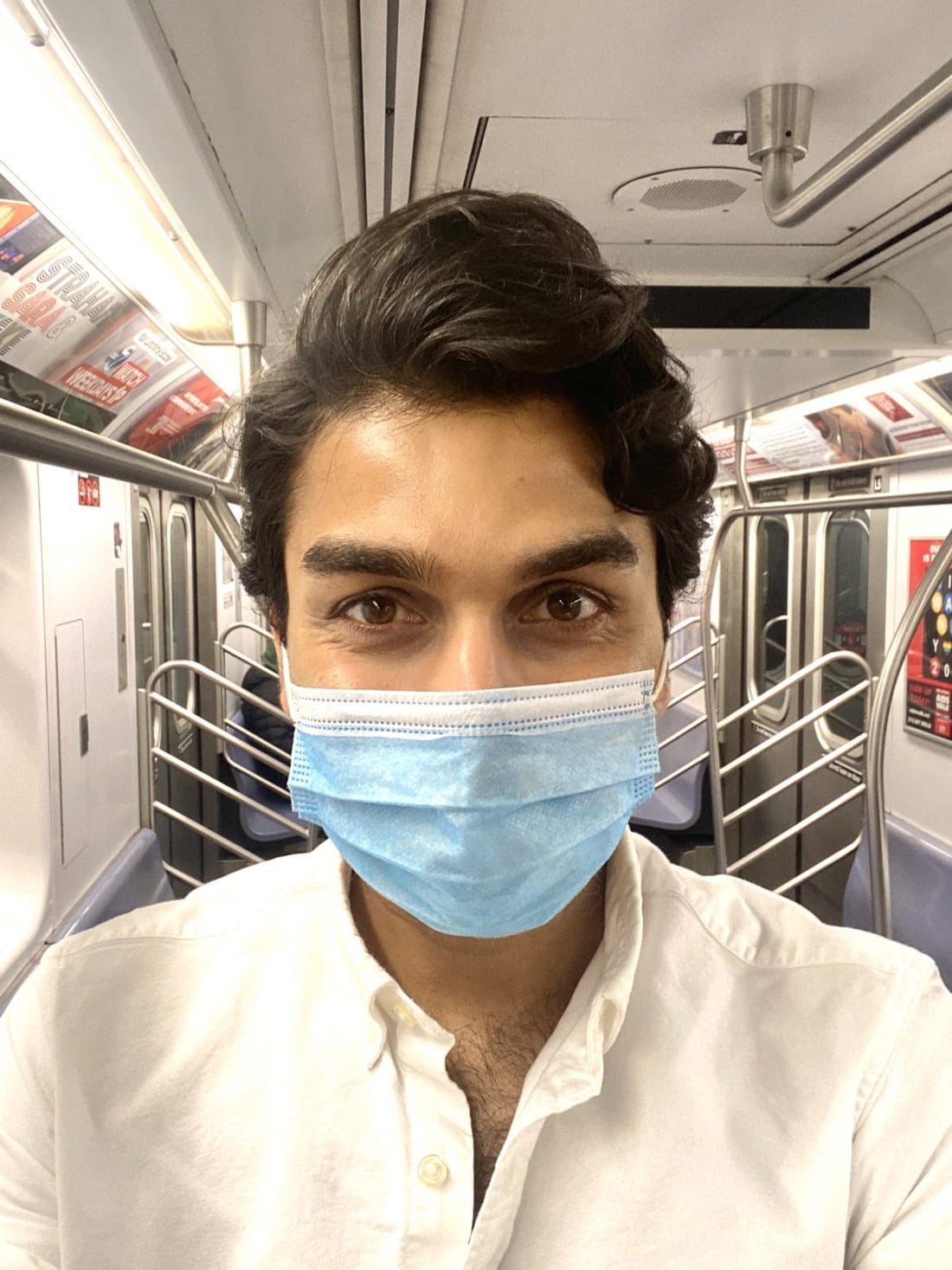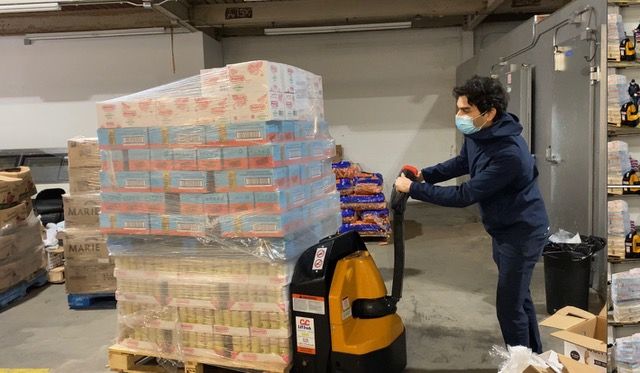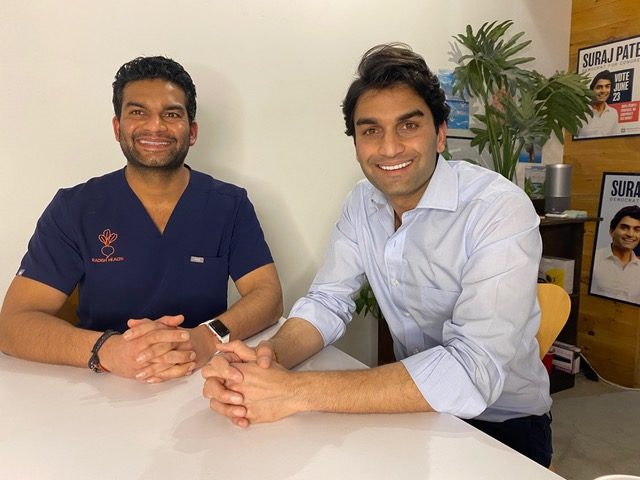Suraj Patel Believes Congressional District 12 Is Ready For A 21st Century Rep


Suraj Patel is trying, again, to unseat Congresswoman Carolyn Maloney to represent Greenpoint, Upper East Side and Long Island City in Congress. Maloney has served the district for 29 years, and the son of Indian immigrants believes it is time for Congressional District 12 to elect the next generation of representatives with bold ideas and looking to the future.
We talked with Patel on the phone this week about what he thinks we could be doing better to weather the crisis and be more resilient in the future, the importance of investing in science, and modernizing America. The conversation has been lightly condensed and edited for clarity.
Bklyner: How are you?
Suraj Patel: I’m good. We’re down to the last stretch of this campaign, and I feel really good about where we are and where we’re going. My experiences around this whole thing have been honestly life-changing, both personally and politically.
We’ve done dozens of different Zoom conversations and town halls around small businesses, restaurants, around sexual assaults, around domestic abuse, and there’s a palpable sense of frustration out there – saying where the hell is Congress and our government? Where’s our support in any which way you look at it?
New York has been left behind or forgotten in the Federal response per death, per infection, per person, per tax dollar we typically send to Washington, D.C. Where are our representatives that are fighting for families and not the big banks and corporations to fund their campaigns? If you’re not going to do the job, you shouldn’t be running for the office. And I think that’s where we’re really finding the mood of the people is.
B: You worked for your family following the Great Recession. How are they weathering this crisis?
SP: We’re in the same boat as everybody else. We manage motels. That’s not luxury hotels, as Ms. Maloney tries to paint them as but Super 8’s and HolidayExpress’s. I haven’t been intimately involved because of this campaign, but as a hospitality business, we’re facing what everyone else is facing – which is – how do you take a PPP loan from the federal government that you owe back? If you don’t hire back by June 30th, if you know that you’re not going to be able to ever be at the same levels of occupancy in business?
I graduated from law school in 2010 and I was, you know, looking at a bunch of really remarkable opportunities and in different places, including the Obama White House, and I ended up having to join my family company because we faced seven bankruptcies simultaneously during the financial crisis. And I thought after that, like this will never happen again in my lifetime, because there’s a once in a hundred-year situation. And 10 years later, we’re faced with the same challenges, if not much more acute.
B: You Tweeted you had Coronavirus early on, in late March?
SP: Yes. I live with my brother, who’s an emergency room doctor at Bellevue. My brother’s girlfriend is a cardiologist. And so we were bound to probably be early to get this thing and we did, and it gave me the opportunity to, well, for one, spend seven days in bed. But then for the next week, two weeks or so when we’re recovering — it was slow — we’re all sitting there and we did a lot of research and writing.
We unveiled the first universal testing plan because we knew how important it was that we were confident that we had coronavirus, that we knew we passed it, that we knew we had antibodies, and we were donating plasma to Mt. Sinai.
It [that knowledge] allowed me to get back out in the community. I’ve delivered over a thousand meals myself personally to seniors across the district. My team has made a hundred thousand phone calls checking on folks in our district to see if they need anything. We’ve delivered dozens of delivery drops of supplies like water, toilet paper, food, milk, milk was a very common request for some reason anyway, at a moment’s notice.

B: What frustrates you about the current situation?
SP: What frustrates me is these Democrats seem to relish the opportunity to say, oh, you know, ‘where are the tests’, ‘Trump has failed” and then wait for him to fail. But you are a co-equal branch of government. Why would you leave Washington, D.C. in the end of March without funding or asking for a universal testing plan? Why?
And so I think leadership is about putting forth bold ideas and real ideas ahead of, you know, poll testing and focus grouping them, because they’re based on sound science because you have the intellectual curiosity to do your own research.
We wrote this [testing plan] during our recovery period during coronavirus in late March. The day that we released that Carolyn Maloney herself had tweeted, you don’t need tests. Stay home if you’re feeling sick. You know, whatever. Don’t shame people for their desire for certainty in order to cover up for your own failures to provide universal testing. [Editor’s note: Congresswoman Maloney’s Tweet was in line with CDC guidance at the time]
I think this crisis is going to call for the leaders for the next decade to bring this country back. It’s not going to be a short little thing. We know how much this is going to hurt and we know how much the economy needs to be restructured and how badly the social contract was broken. And I think that’s why we are very confident of a victory on June 23rd, because this is where the people are at. They’re not hiding, they haven’t disappeared like our Congress.
B: Has your experience of the pandemic and what you have seen when you talk to people changed how you think about the issues and how they rank in your mind?
SP: I am a progressive and we want to talk about these big issues a lot, like, you know, climate change, mass incarceration, immigration, all those kinds of things nationally. But when the pain is felt so personally and in your district, you start really thinking about, wow, first we’ve got to get back up on our feet.
First, we’ve got to restructure and make sure that whatever recovery comes is ‘wage-led’. It’s led for workers and it’s led to for the folks that are caregivers and frontline heroes and folks who, you know, in the prior economy, we’re sort of last in line for more support. And I get to see it, you know. And by the way, I got to admit, if this is a dress rehearsal for climate change, then we failed, utterly failed.
We also have to prepare this country for bigger calamities. Back in the fall we wrote something called the Discovery Project, which is a policy that I was going to run on and I’m still running on that calls for a space race scale investment in global public research and development.
At the height of the space race, we invested two percent of our federal GDP into federal research and development. And today that number has been around 0.7 percent in the last decade – about a 300 billion dollar difference. And you’d be shocked to know that 22 percent, only 22 percent of NIH grants are approved. That means 78 percent of research for the last decade, much of which would have been in biology, virology, and pandemics, was rejected. We have no idea what we missed out on. And we’ll never know, you know.
So I think this calls for leaders who aren’t concerned as much about their two-year election prospects and calls for leaders who are thinking about long term investment and structural change. And that’s where, you know, it really has crystallized for me. I really did think, you know, this is exactly what was needed for a long time. And now we’re seeing it all fall around us.
B: What is the biggest concern of your constituents? And what is the difference between the Upper East Side and the outer boroughs?
SP: Well, it would have been different a few months ago, I would say. We have the most diverse and certainly the most unequal district in America. But I think now the concern is very similar across all groups. People are really worried about, you know, really worried about the priorities, relief for New York, really for families and fixing the system.
I think New York needs fighters in D.C. Everyone knows that the governor keeps talking about how New York has been left out of this recovery. Well, he can call up the same Congress people that are “senior members” and ask where are they, why aren’t they throwing chairs, why aren’t they fighting for more support for New York? And how could it have gone so badly?
We need relief for families. We started this campaign with a family opportunity guarantee as our main policy. And that’s the kind of bold policy that creates a universal child allowance, a public option for child care, pre-K nationwide and paid family medical leave and Medicare for kids. It’s like that’s the kind of policy we need to support all families, whether in the Upper East Side or Greenpoint or Queensbridge. A universal program that can get families back on their feet and give families, not corporations, sit at the table. I don’t think that that is different by geography anymore.
I do think that we need to lead with science.
B: What has the pandemic shown you about your district that you didn’t know before?
I think that we always knew that there were inequities in our healthcare system and our access to support. But this has been something we often talk about in the abstract. “Oh, you know, black people don’t have access to healthcare. We don’t have access to resources.’ And now that abstract, it’s just so painful to watch how it became reality, and that reality really translates directly to life and death.
B: What do you think we need for recovery? And how do you think we can be better prepared next?
I mentioned to you long term infrastructure investments in research and development. Elevating science instead of attacking it, elevating doctors and scientists instead of attacking them with conspiracy theories. Those kinds of things are just the bare minimum.
But first things first – until we get universal testing–That’s the best stimulus in the world, right? –until we get to universal testing and tracing, we can’t reopen the economy and if we can’t reopen the economy safely, then it won’t matter. All of this is moot. We’ve been talking about testing ad nauseum since the beginning of this crisis and that’s still the first and foremost thing we need to have to open up the economy.
Then we need to cover budget shortfalls for states in order to make sure that they stay afloat. That hasn’t been done yet. We need to instruct the Federal Reserve to conduct broad municipal bond purchases. I think we should federally fund payrolls. I said that the Denmark and U.K. system of federally funded payrolls was the smarter way to go way before the CARES Act even came out, and I still believe that. I think we need universal monthly stimulus checks to individuals during this crisis. We need broad rent relief during this crisis. We need to federalize unemployment insurance so that states aren’t facing this massive shortfall on unemployment. Also mortgage relief.
Brooklyn is full of wonderful small businesses. Anyone who has ever run one knows, any worker knows, the cash flow is the lifeblood of every worker, every family and every small business. Right. It’s the only way. Noone can run on zero cash flow. You just can’t do it. No one could do it more than a couple weeks at best. So this isn’t a moral hazard issue. These things are about keeping people afloat so that we don’t have a prolonged, miserably slow recovery. Getting cash to people who need it when they have zero cash flow is precisely what all these policies should be aimed towards right now.
How do you think the pandemic has changed us as a society?
So, man, it’s beginning to sink in. I think, unfortunately, you know, it’s going to be longer than anyone thought at the beginning of this event. Looking at years of changing our travel habits or distancing our eating habits, all these things until there’s a legitimate coronavirus vaccine. I think we’re in for the long haul.
This is a crisis that’s laying threadbare, how broken our government is, how broken our political system has been, how short term thinking has been. I just think there is a breaking point. People have already begun saying the earlier institutions are in need of a major upgrade, a major modernization. We are not capable of facing challenges as a country in the way that we should be because our governments fail. I do think that.
B: Do you think we’ll manage another four years of Trump?
SP: No. No, absolutely not. You know, we will work our butts off. This is the most important election of our lifetime. I’ve said it time and again.
This coronavirus crisis is showing us how important it is to vote and to vote for expertise, science, and not just ignore it. I think that this election, my election is the first opportunity for people to say that our governments failed us. And it’s time for new representation and new energy in politics. This election. The June elections. The canary in the coal mine.
If you want change in November, you can’t do the same thing in June. If you want the country to change, you can’t possibly consistently return the same person for the 29th year to Congress, especially in this crisis. I sincerely believe what.

B: What gives you hope?
SP: What gives me hope? Look, every day at 7 o’clock we go out there and cheer our health care heroes. It’s personal, because I think about my brother, who’s an E.R. doctor. I also think about my grandmother and my family who came here in the late 60s, early 70s. Our first business was running a little bodega, my parents worked as security guards. My dad was an MTA engineer, he fixed track at night and my uncle delivered pizza.
All those jobs are now “frontline” as well, and the lifeblood of the city that’s running it right now. Your delivery people, your bodega, all those folks are my family, you know, in some manner. And it’s a testament to the power of education, opportunity and mobility that those folks, you know, were able to send a son through college and med school in a country they just came to after, you know, 20, 30 years. And that person is now frontline with people cheering for him. That’s pretty hopeful.
There are a lot of things that are still right with or maybe can be righted with our country. And opportunity, education, mobility shouldn’t depend on the zip code or your birth or whether you were here for one hundred years or you just came here this year. That’s what New York embodies and that’s where we’re gonna go with this.
And regarding this crisis I think – ‘this too shall pass’.




